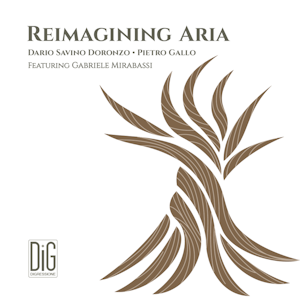
Daniele Sardone
Reimagining Aria
Dario Savino Doronzo (flugelhorn)
Pietro Gallo (piano)
Gabriele Mirabassi (clarinet)
rec. 2023, Digressione Studios
Digressione DCTT138 [52]
I thought long and hard whether this disc fell under the Jazz heading – and thus no longer appropriate for this site – but finally decided that the compositional hand of Daniele Sardone was just about sufficiently authoritative to allow it in under crossover/recomposition. There’s also the precedent of Dario Savino Doronzo and Pietro Gallo having already released an album called Reimagining Opera (review). Reimagining Aria is once again a case of ‘honouring the past in order to have a dialogue with the present’ though these arie antiche are subject to some windy justifications in Doronzo’s booklet notes of which this is a representative example: ‘Jazz blended naturally with cultured music; one morphed into the other almost imperceptibly, unifying and resonating beyond divisions.’ If that sounds like your kind of bag, read on.
In the previous CD there was an occasional third instrumental voice, that of Michel Godard who played, of all things, the serpent. Here we have the more conventional, and excellent, clarinet of Gabriele Mirabassi. Composer and arranger Daniele Sardone has taken these baroque arias and uses them, explicitly or implicitly, as the basis for improvisation. Sometimes the tunes are more overt but at other times there’s a pellucid quality to them that means the listener remains expectant for ‘the tune’. Take Antonio Cesti’s Intorno all’idol mio where an initially elliptical piano statement grows more plangent and up tempo, allowing fugal invention when the flugelhorn enters. The music is irradiated with plenty of incident.
Or take Caldara’s Sebben, crudele which is played straight over a kind of pianistic tolling motif that leads to a Gregorian episode in which the clarinet joins. There’s a Jarrett-like rhapsodic feel and opportunity for freer improvisation (actual or notated, I’m not quite clear) before the elegance of the tune draws the trio back. Scarlatti’s Chi vuole innamorarsi has a great deal of rhythmic buoyancy to it, as well as some keyboard flurries though O cessate di piagarmi has a more regulated structure, with unaccompanied solos from flugelhorn and clarinet that are more focused on mulling over the chords until the music moves towards a rewarding passacaglia. Gallo plays Marcello’s Quella fiamma che m’accende as a solo vehicle infusing it with Gallic harmonies in a habanera reinterpretation – rich, resonant and stripped back.
The musicians are allowed space by Sardone whose frameworks are never constricting but never as simplistic as stating the aria’s tune and allowing the players to improvise on its chords. Rather, there is invention and pleasure to be had from the constant motion work on Caccini’s Tu c’hai le penne, amore as well as Gallo’s slow solo mid-point. About the extensive Chopin quotation in Cavalli’s Delizie contente che l’alma beate – refracted in its piano iteration, then stated in full by the flugelhorn – I am very considerably less impressed.
The studio production values in this release are higher than in Reimagining Opera and I wasn’t disturbed here, as I was there, by some studio noises and other recording detritus. If you fancy this blend, this melange, this whatever-you-call-it, of baroque-meets-improvisation, there’s no doubting the instrumental finesse on offer.
Jonathan Woolf
Help us financially by purchasing from

Contents
Antonio Cesti (1623-1669)
Intorno all’idol mio
Antonio Caldara (1670-1736)
Sebben, crudele
Alessandro Scarlatti (1660-1725)
Chi vuole innamorarsi
O cessate di piagarmi
Benedetto Marcello (1686-1739)
Quella fiamma che m’accende
Giulio Caccini (1551-1618)c
Tu c’hai le penne, amore
Francesco Cavalli (1602-1676)
Delizie contente che l’alma beate
Nicola Porpora (1686-1768)
Dall’amor più sventurato


















